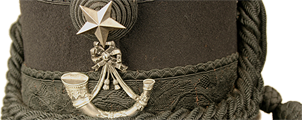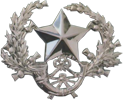Memories of Service Part III: Dr Ron Callender
Part three : The Belgium Exercise
In 1953, National Service slid into a continued service of three and a half years with the Territorial Army. As a Cameronian, it was necessary to answer a call and attend “D Company” at a drill hall in Wishaw. Here, about twenty to thirty men assembled around a good-natured Sergeant who summarised our near future. As he handed out shoulder badges, he explained we were now one small unit of the 264 Scottish Beach Brigade. Somewhat stunned, we formed ranks for a talk by the Officer in Charge, who attempted to explain what it all meant.
At the time, however, it was a bit of a puzzle but it was an attractive badge that had been distributed. The next meeting was to attend the barracks in Hamilton at 2pm, one Saturday. After a morning at work in uniform, the East Kilbride Chieftain bus dropped me off at Hamilton’s ‘top cross’, and a brisk march led to the barracks. This was the Cameronians ‘Head Office’ and seemed to be teeming with soldiers all asking the same question, “What are we doing here ?” Army trucks arrived and the troops clambered on board for a journey through Hamilton to the Chatelherhault High Parks. Recalling the occasion is not easy … it may have been shooting practice. Daylight was going and the trucks ferried everyone back to the barracks in Hamilton.
Life continued in this way with monthly meetings at the Drill Hall in Wishaw and the occasional muster in Hamilton. There was an obligatory summer camp held in the County of Moray; nearby, a convenient bus service travelled to Elgin. In a public house, the barman was shocked when he came to serve us … he remembered us from the Egypt days and was so overcome with emotion that the first round was on the house.
Back in Wishaw, we were briefed on the annual camp for 1954. It would take place in Belgium when the 264 Scottish Beach Brigade would be an important part of Exercise Winch. The journey started with a slow train journey south to a ship waiting in Harwich dock. One singular amusement occurred. During a brief pause at Newcastle station, a few soldiers left the train to search for a cuppa tea. All went well, until that the train departed … and they remained on the platform !
On arriving in Zeebrugge, Belgium, umpteen squads formed up and marched to camps for an allocation of tents … that is, six men to a tent & wait for more instructions. Of course, we waited.
There was activity the following days following a selection of men for duty on the beach, which was like a film set by now. A ship at anchor swarmed with men receiving bulky bundles that descended into amphibious craft, known as DUKWs.
Elsewhere, whenever there was space, DUKWs pitched up onto the beach and teams set about unloading the huge bundles for transport to lorries nearby. [Author’s note: Here my memory is hazy but I can recall using short lengths of narrow gauge rails which fitted together so that wheeled trolleys could whisk the heavy packages along the sandy beach. Can any reader verify this ? ]
All went well for a few days. There was variety in the tasks being handed out. Some folks were sea-sick, some DUKWs lost their loads, which floated away until rescued by the Military Police operating from speed boats. Free afternoons that were allocated to Bren gun practice developed into speed challenges. Bets were exchanged but in each race, the duty sergeant failed to beat “Big Ned” who knew the Bren gun backwards.
Local tram cars served the holiday resort of Blankenberg and it also was easy to visit the attractive city of Bruges. Our uniforms interested holiday makers … some girls claimed they wanted to practice their English. An ability to speak French also helped to clinch company for the evening.
It was a Thursday. Everything was functioning well. The Beach Brigade was working like a well-oiled machine until an announcement came over the loud speakers set up along the beach. “Return to barracks !”
In two and threes we walked back to camp while discussing the abrupt message. It was later in the day that the explanation was offered … “There will be no need for a beach brigade in future wars.” [Author’s note : Tell that to the men involved in the Falklands War!]
Back home in ‘Blighty’, good news followed. TA service was to be cut to two years. I had done my time. End of story !
Ron Callender April 2024
Copyright © 2024 Dr Ron M. Callender
Postscript
At Question Time in the House of Commons on 2nd November 1954, a summary of our activities summarised the exercise as follows:
Mr. Swingler:
asked the Secretary of State for War to make a statement on the nature of Exercise “Winch”; how many men took part in it; the total cost; why it was held in Belgium; and whether similar exercises will be held in the United Kingdom.
Mr. Head:
This exercise trained 264 Scottish Beach Brigade, Territorial Army, in landing stores across beaches. About 5,000 men, of whom just over 4,000 came from this country, took part. By holding the exercise in Belgium, it was possible for them to handle the normal movement of stores to the British Army of the Rhine, which were diverted through the beaches, so that the exercise cost much less than if an artificial exercise on this scale had been held in this country. The brigade also got valuable experience in working with the Belgian authorities. No similar exercise is contemplated in the near future.
Comments: 0







